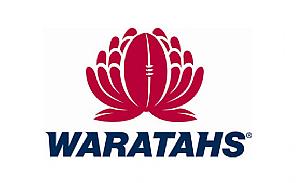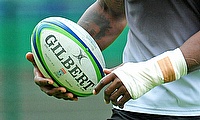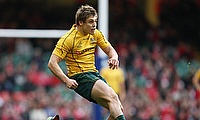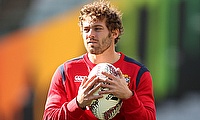Just For Fun: Al Baxter On A Life in the Front Row - Part 2
Part Two: The Waratahs, Scrum Talk and The Future.
In Part One of this exclusive interview with the former Waratah and Wallaby prop, Al told us which players he admired and respected across his career and covered his record breaking time with the national side. In Part Two, he looks back at the highs and lows of his tenure with New South Wales, who to watch out for in the Wallaby front rows of the future, who impressed him at the recent World Cup and what he's up to next.
Which young props in Australia excite you and could go on to dominate the test scene for the Wallabies?
AB: "Well, I think one who is already doing that is Benn Robinson, I think he's just brilliant. I think Dan Palmer is another who is of superb scrummaging pedigree, his old man was a Waratah front rower and he came through the system with Michael Foley. He's a brilliant scrummager and has done very well down at the Brumbies and was obviously affected by injury at the back half of last season. If he hadn't been injured, I think he would have been in the World Cup squad, I think he's superb.
"Sekope Kepu is brilliant, I think his versatility at being able to play both tight and loose at test level is excellent as well as his stuff around the field. He's unbelievable, his running skills are superb. I don't know much about many of the younger guys in the other states but certainly, we've got a couple of young blokes coming through with the Waratahs “ Jeremy Tilse and Paddy Ryan “ who are mountains of men and they are only young, so give them a couple of years of playing top level rugby and I think they'll be pretty amazing.
What about on the global scene, who impressed you at the World Cup?
AB: "I think the French forwards, Nicolas Mas and William Servat, they're very handy front rowers and I think the French churn out a ton of good front rowers - them and the New Zealanders are the benchmarks in that respect. I think the Franks brothers (Ben and Owen) have got a long time to go in international rugby so I think they'll be pretty extraordinary and Wyatt Crockett is also someone who will be an excellent scrummager and is an excellent player. He's got a couple of weaknesses with his scrummaging but not many and he's reasonably young as well. I think the more time he gets with the Crusaders and the test side, he'll just get better and better. His fitness and strength are phenomenal, he's the fittest big guy in international rugby.
"The English, they're always strong, they're always solid but from memory, there's no real person coming through. Dan Cole was solid during the World Cup tournament but unspectacular. I think the Irish loose head Cian Healy was fabulous, he was really strong throughout the whole tournament and his work around the field was brilliant as well. Again, he showed a couple of weaknesses but certainly, the game he had against the Australians was terrific so he's certainly someone to watch coming through. I think the Welsh scrum was solid as usual. They remind me of Benn Robinson with their efficiency, if a scrum is lost they don't bother but if they think they've got a chance then they'll go nuts.
Australia's other Rugby Championship opponents in this year's revamped Tri-Nations “ South Africa and Argentina “ are two nations steeped in the traditions of forward play as well. How are they traveling?
AB: "Well, I think it's the absolute opposite to Wales with the Argentinians, where every single scrum they will go a hundred per cent. It's a bit like the old Muhammed Ali 'rope-a-dope' where they can actually do themselves in having gone for an eight men shove in every scrum because they're so knackered half way through the second half that you can actually get some gains against them.
"In South Africa you've got Jannie du Plessis who's an old head and an excellent scrummager and they've rotated a few of their loose heads recently and they're strong. They've got a couple of good young blokes at the Bulls, Dean Greyling and Werner Kruger, and a couple more years experience for those guys in Super Rugby and they'll be pretty strong. I think the World Cup tournament was pretty good to watch in general for scrummaging and there were some great battles typified by the final, where the New Zealanders did their best early on in that game and the French came home with a wet sail and put a ton of pressure on them and were scrummaging brilliantly.
The eyes of the sporting world were on the tournament and thankfully, there weren't as many reset scrums as we've become accustomed to in recent years to fuel the negative barbs thrown by rugby's naysayers. Do you think things are finally starting to settle down since the advent of 'crouch-touch-pause-engage'?
AB: "Yeah, I think as everyone's got used to this long, slow call, it's been better but that's still one of the bug bears, that five to seven second hold. My personal view is that you should just go back to crouch and engage. When you change something as significant as that, I think you have to change the motor patterns of all eight people in the scrum for it to be a success. If you held all the blokes at the start of a running race or a swimming race for seven seconds, in that ready position, they wouldn't know in that seven seconds when the gun is going to go, they've just got to be ready for it and you would get a ton of misfires and restarts. However, give them twelve months and they would get used to it and they'd develop strategies and tactics for it and that's exactly what's happened in scrummaging. You have the first twelve months where you get a lot of misfires because eight people are on their toes waiting for that starting gun and it takes twelve months of motor training to get it to a situation where you're able to hold for that length of time.
So you think it will level out now and not be as much of a problem?
AB: "It depends how referees want to referee it. I think sometimes referees are over pedantic in that area, sometimes they should just let things go, let things happen. Generally, I think referees did pretty well at the World Cup. Some decisions were poor but “ like players “ referees can have poor games as well but overall, the standard of play was pretty good and the standard of referees was pretty good as well.
You played in New South Wales' most successful period of the modern era with appearances in two Super Rugby finals and two more semi-finals but that elusive trophy still eludes the Waratahs. How do you reflect back now on those two grand final losses to the Crusaders in 2005 and 2008 in Christchurch?
AB: "I think both finals were frustrating but I can't take anything away from the Crusaders, they're such a good side and if you give them only ten minutes in a game, they will score points. In both those games we were leading and playing really well and I remember Lachie Turner turning over Crusaders ball in the 2008 match when we were leading but the clearing kick didn't go out. They got to counter attack again while everyone was still sprinting back and they scored and you sit there thinking 'that was one mistake on the back of some pretty handy play from us and they scored'. That was pretty much the only difference in the match so, good on them, if they can do that they deserve to win it.
What about your last year with the Waratahs. It started out very promisingly but injuries cruelled the squad's chances throughout the season didn't they?
AB: "The loss to the Cheetahs at home last year is right up there with the most disappointing memories but the most frustrating was the first round of the finals in Auckland where there were literally fourteen starting players - including myself - sitting back in Sydney watching that game because we were injured. We all got together and were all sitting in the room watching and it was like having a starting Waratah Academy team run on - it was horrendous. The guys were playing their hearts out, doing some great stuff but we had club players playing out there, we had Hugh Perrett and Elvis Taione the hooker - guys literally straight out of club rugby - playing in a final in Auckland against the Blues and it was just horribly frustrating.
"We were sitting there saying 'we're such a better team than this, if only we'd had one more week we could have wheeled out twice as good a side'. Take nothing away from the guys that went over there because they played a brilliant Blues side who played really well and our blokes played really well but it was just guys who hadn't played together for very long and a lot of them had been training with their club side for all of pre-season and most of the Super Rugby season and only just got into the team. That was tough to watch.
As time goes by, do you think it will be certain games, certain wins or losses that will stick with you or the people you played with and the experiences you shared?
AB: "I think from the players and ex-players that I've spoken to that this is pretty true of everyone. As you go away from those wins, you remember them less than actually the enjoyable times you had with the blokes from those teams. You can have a win but if, for whatever reason, the team wasn't functioning as well as it could or there was a lack of unity or whatever, you don't actually see it as being enjoyable whereas even if you have a loss but the teams doing well and there's good blokes in the side, you remember it as enjoyable or as a good game.
"I remember the teams that were good to be a part of, such as the Wallabies from 2003 and 2004, they were a pretty unbelievable side and I guess the Waratahs for the past six years. They have been the form side in Australia - discounting the back half of last year - but definitely for the six years before that and that team has been a really good bunch of blokes with really good systems in place and enjoyable to be a part of.
Is that what you're going to miss the most “ the camaraderie of the dressing room?
AB: "One hundred per cent. It's not the three hours training on the paddock that you're going to miss, it's the camaraderie, it's being able to travel the world with twenty-five good blokes, most of whom are close mates, that is the bit I'm definitely going to miss.
Could you ever have dreamed when you started out on this adventure, that you would end up as the most capped Wallaby prop of all time?
AB: "No! - I didn't even think I'd end up being a professional footballer! I was playing colts at Norths and loved my rugby and just thought I'd have a run around there and when I finish up with my Uni studies, I'd play for them on the weekend and do full time work in between but I got a call up to the Waratahs in my final year of Uni and got a professional contract.
"Then, after playing for the Tahs for a couple of years, I thought I was no hope of playing for the Wallabies and thought I'll just go back and do a real job but it just kept going and going and I guess it's one of those things that when you enjoy something so much you keep putting the hard work in and the time and the effort and you get further. I was stoked just to play one Waratahs game and then to play one Wallabies game and when you end up with a whole ton of them under your belt then it's great, but it's something I never expected.
Do you pinch yourself when you look at the famous names that preceded you in that Wallaby number 3 shirt and the fact that you ended up playing more than any of them?
AB: "Look, caps are one of those funny things where “ it's a bit like the odometer on the clock of a car - if you just keep driving it'll just keep ticking over. It's something nice to have but it's not something you really hang your hat on too much because being in the position for a long time is just that - being in the position for a long time. Yeah, you do look at those guys but I look more at some of their achievements such as winning World Cups and winning Grand Slams and those sort of successes to see that they were pretty extraordinary players.
What's next for you Al. Obviously, architecture will become a mainstay of your life now rather than a part-time passion?
AB: "Architecture will be the mainstay of my post rugby life but I'm still keeping strong connections to rugby at all levels through some coaching, administration and watching my sons start up with the Clovelly Eagles. I think I'd find it really tough to leave completely as I've really loved my time in the game and I don't know how I'd go if I went cold turkey after having played it for the last 28 winters! Luckily, my new role in Cox Richardson Architects will also keep me connected to rugby as well as I will be joining their international sports division and one of my first projects will be the redevelopment of the Sydney Cricket Ground as well as looking at potential improvements to the Sydney Football Stadium. Generally though, I'm really looking forward to not having to spend weeks on end away from my family every year and I'm also looking forward to having my first pre-season off since 1998!
Any plans to move into coaching “ at any level? Do you see yourself playing a role in the future of the game in Australia?
AB: "I will be doing some coaching consulting with Norths next year as well as for some country rugby teams and for a professional junior academy run out of the Moorabin Rugby Club in Melbourne. I'll also help out with my son's rugby teams - if they want me! - but there is no grand plan to get into coaching full time as I'm really excited about being able to work as an architect working on stadiums all around the world. Also, I think being a full time coach would be tough as you have all the same stresses as a player in terms of travel and pressure to perform but no chance to actually do the fun stuff, which is to play!
Final question “ what is Al Baxter's legacy to the game of rugby?
AB: "I guess the big one is just having enjoyed it. In all honesty, I would love to see the guys who come after me get as much enjoyment out of the game as I got out of it. Like anything, as much as you put in is as much as you get out and I realise that you can get just as much enjoyment when you're coaching juniors or when you go and see people out in communities. It sounds such a cliché but it's such a big thing “ go out and enjoy it!
This article was previously published at www.ruggamatrix.com
Credit “ Getty Images









